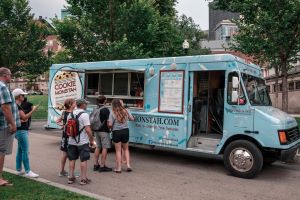Mobile Food Unit
A mobile food unit is a food and beverage service establishment that is a vehicle mounted unit, either motorized or trailered, and readily movable, without disassembling, for transport to another location. The unit can operate no more than 21 days annually at any one place unless it is operated at the site of and in conjunction with a permanent business licensed under Minnesota Statutes Chapter 157 or Chapter 28A. All mobile food units must be operated in compliance with the Minnesota Food Code.

Plan Submission
Plans, specifications and applicable fees must be submitted to the regulatory authority for review and approval at least 30 days before beginning the construction of a mobile food unit. The plans must include:
- The intended menu and the anticipated volume of food to be stored, prepared, and sold. Please note that the regulatory authority may restrict the type of food served or the method of food preparation based on equipment limitations.
- The proposed layout, mechanical schematics, construction materials, and finish schedules.
- The proposed equipment types, manufacturers, model numbers, locations, dimensions, performance capacities, and installation specifications.
- Detailed information on any custom fabricated equipment.
Please contact the regulatory authority for a preoperational inspection at least 14 days prior to opening.
Licensing
License applications and fees must be submitted to the appropriate regulatory authority prior to operation.
Contact the area inspector to set up a licensing inspection. Refer to the Retail Food Program page for information on license fee and what to expect during the inspection.
Location and Construction
- Except for supply, the entire operation must be accomplished from a single self-contained unit. Locate the unit away from possible contamination sources.
- Exterior surfaces of the unit must be of weather resistant materials.
- The unit must provide protection during adverse weather by its construction or location. Food activities must cease in adverse weather if the interior of the unit is not adequately protected from the weather, windblown dust and debris.
- The floor, wall, and ceiling surfaces must be smooth, durable, and easily cleanable. Floor surfaces should be vinyl or equivalent.
- Interior lights must be shielded or coated.
- In addition to the Minnesota Food Code, other applicable codes may apply. Other requirements include ensuring that gas hook-up and services comply with the State Mechanical Code (Minnesota Rules, Chapter 1346), electrical services comply with the State Electrical Code (Minnesota Rules, Chapter 1315) and that a fire extinguisher with a minimum 2A 10 B C rating is provided if required by the State Fire Marshal.
Food Sources
All foods, beverages and ice must be obtained from an approved commercial source. Any food preparation done off site, must be accomplished at a licensed food establishment.
Equipment
- All equipment used in this operation must meet applicable NSF International food service equipment standards.
- A mechanical exhaust system must be provided when grease laden cooking vapor, condensation, fumes, obnoxious or disagreeable odors, or smoke are generated in the cooking process.
- Mechanical refrigeration must be provided for all potentially hazardous food.
- Accurate temperature measuring devices must be provided in each refrigeration unit containing potentially hazardous foods, and for monitoring internal food temperatures.
- Single service disposable utensils must be provided for eating and drinking purposes unless approved warewashing facilities are provided.
Dishwashing Facilities
If multiuse utensils are used, provide dishwashing facilities which consist of at least a three compartment sink, either freestanding or installed in a counter. Space must be provided for air drying utensils.
Handwashing Facilities
A separate handwashing device supplied with hot and cold running water, soap, nailbrush, and paper towels must be provided in areas where food is prepared.
Water Supply
The water supply in a mobile food unit must meet the following requirements:
- Water must be supplied under pressure with a mixing faucet.
- Water must be obtained from an approved public water supply system. Water can not come from a residential well.
- Water tanks must be provided which are easily cleanable, of sufficient capacity to meet the needs of the operation, and constructed of an approved non-toxic material. The water inlet must be protected from contamination and be designed to prevent attachment of a nonpotable service connection.
- Hoses used to obtain water must be of food grade quality and provided with an approved backflow prevention device.
- Water tanks, pumps, and hoses must be flushed and sanitized before being placed into service after construction, repair, modification, and periods of nonuse.
Waste Disposal
- A waste water holding tank must be provided which is sized at least 15 percent larger in capacity than the water supply tank.
- Waste water must be removed in such a manner that a public health hazard or nuisance is not created. Waste water must be discharged into a sanitary sewer or other approved sewage treatment system.


